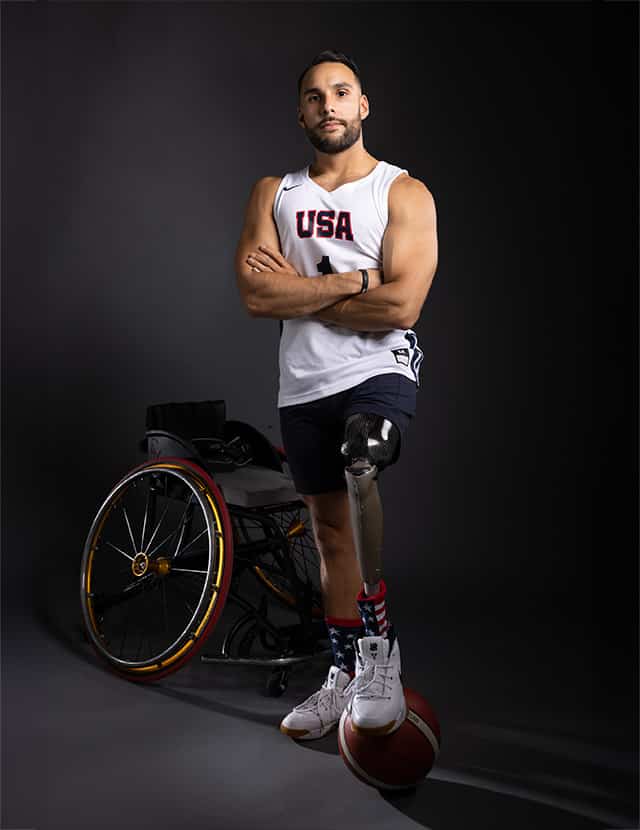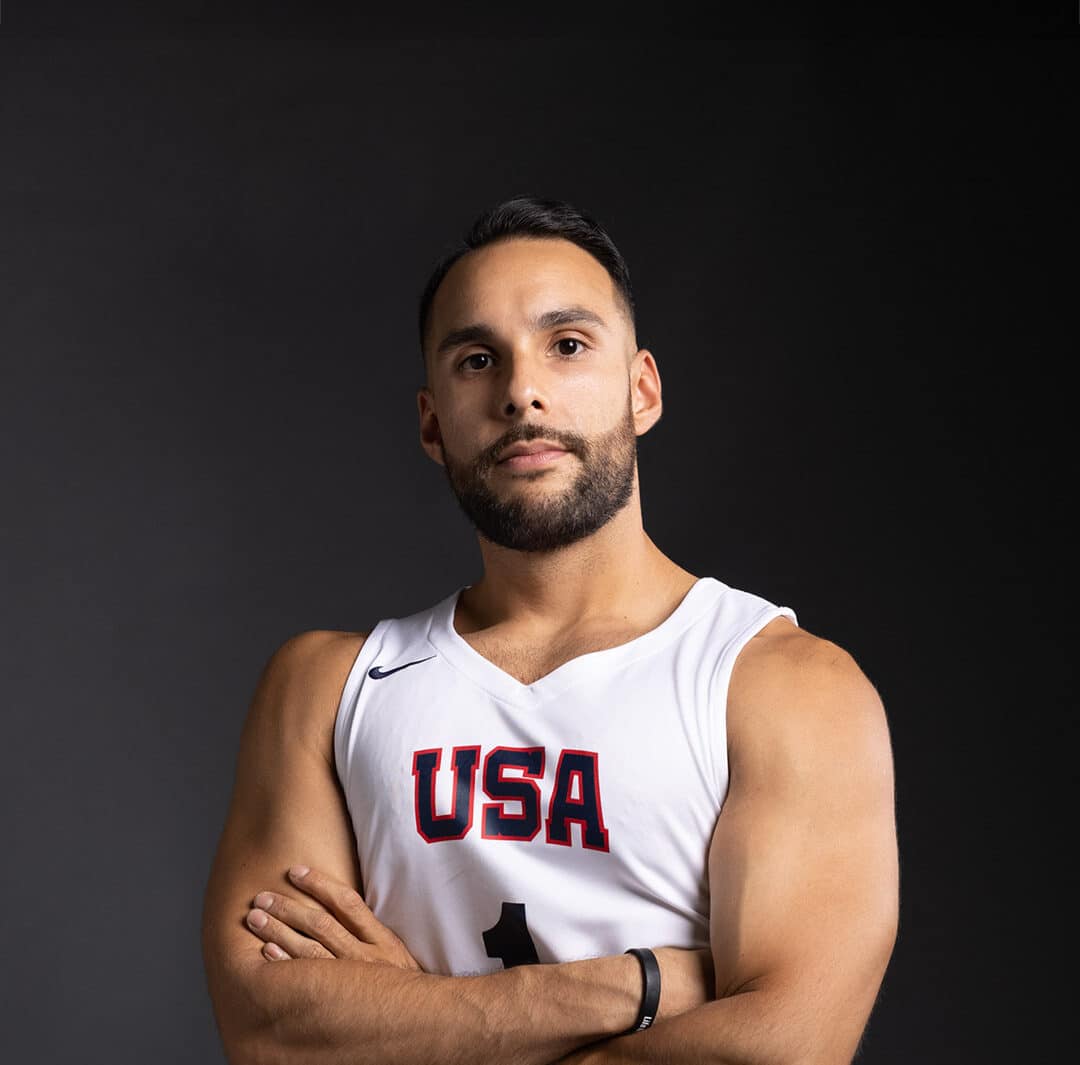Jorge Sanchez faced a pivotal moment in his life when he was diagnosed with osteogenic sarcoma at eight years old and, after countless surgeries and treatments, chose to have his left leg amputated. He found solace in sports.
“Wheelchair basketball became my sanctuary where I felt free and like myself,” Sanchez says. “The sport allowed me to push my physical limits, find camaraderie among my teammates, and regain my confidence.”
Finding that renewed sense of purpose led him on a journey of playing wheelchair basketball at the highest level overseas in Spain and with the US men’s national team. In 2020, Sanchez won a gold medal at the Paralympic Games in Tokyo.
Sanchez is also a leader off the court as a public speaker and an advocate. “At the end of any speech I give, I want people to walk away with a renewed sense of hope, inspiration, and a deeper understanding of the potential within the disabled community,” he says.
Ahead of the 2024 Paris Olympics and Paralympics, Sanchez spoke with us how basketball influences his leadership, his advocacy for the disabled community, and how the sports industry can better support and represent athletes with disabilities.
How do you apply the principles of teamwork and discipline from basketball to your leadership off the court?
In basketball, success hinges on the collective effort of the team, effective communication, and trust among teammates. Similarly, in leadership roles, I prioritize collaboration, active listening, and fostering an environment where everyone feels valued and empowered.
Discipline, another key principle, translates to setting clear goals, staying focused, and maintaining a strong work ethic. These principles guide my approach to advocating for the disabled community, ensuring that our efforts are coordinated and our voices are unified.

What qualities do you believe are essential for effective leadership, especially in advocating for the disabled community?
Effective leadership, particularly in advocating for the disabled community, requires empathy, resilience, and a strong sense of purpose. Empathy allows leaders to understand and connect with the experiences and challenges faced by individuals with disabilities. It fosters an inclusive environment where everyone’s voice is heard and respected. Resilience is crucial in overcoming obstacles and setbacks, and in maintaining momentum towards achieving our goals. A strong sense of purpose provides the motivation and direction needed to drive meaningful change.
What motivated you to become an advocate for the disabled community, especially within sports?
My motivation stems from my personal experiences and the transformative power of sports in my life. After my cancer diagnosis and subsequent disability, sports became a crucial part of my rehabilitation and personal growth. I witnessed firsthand how sports can empower individuals, build confidence, and foster a sense of belonging.
However, I also became acutely aware of the barriers and misconceptions that individuals with disabilities face in accessing and participating in sports. This realization fueled my desire to advocate for greater inclusivity, accessibility, and representation in sports. I want to ensure that everyone, regardless of their abilities, has the opportunity to experience the benefits and joy of sports.
Will you share moment where you felt the firsthand impact of the work that you do?
One of the most memorable moments during my time as head coach for the Golden State Warriors Academy and the Challenged Athletes Foundation (CAF) wheelchair basketball camp was when I saw the transformative impact on one of our campers.
There was a young athlete, about thirteen years old, who had recently started using a wheelchair. When he first arrived at the camp, he was shy and hesitant, unsure of his abilities and his place in the sport. Throughout the day, my team and I focused not only on teaching basketball skills but also on building confidence and fostering a sense of community. On the end of camp, we held a scrimmage game where everyone got to showcase what they had learned.
This young boy, who had barely spoken at the beginning of the camp, scored his first basket. After the game, he came up to me with his parents, who were visibly emotional. They thanked me for the camp, sharing how their son had found a new sense of self-belief and joy.
It reinforced the importance of providing opportunities and support for individuals with disabilities. Moments like these highlight the impact that inclusive sports programs can have, not just in terms of athletic development but in empowering individuals to thrive both on and off the court.
My goal is to inspire others to see their own potential and to pursue their dreams, regardless of the challenges they may face.
Jorge Sanchez
How can the sports industry better support and represent athletes with disabilities?
The sports industry can better support and represent athletes with disabilities by prioritizing inclusivity and accessibility in all aspects of sports. This includes investing in adaptive sports programs, providing adequate resources and facilities, and ensuring equal opportunities for participation and competition.
Representation is also crucial; showcasing the achievements of athletes with disabilities in media and marketing helps to challenge stereotypes and promote a more inclusive narrative. Additionally, fostering partnerships with organizations that advocate for disabled athletes and actively involving them in decision-making processes can lead to more effective and meaningful change.
What legacy do you hope to leave behind as both an athlete and an advocate?
As both an athlete and an advocate, I hope to leave a legacy of empowerment, resilience, and inclusivity. I want to be remembered as someone who broke down barriers and paved the way for future generations of athletes with disabilities.
My goal is to inspire others to see their own potential and to pursue their dreams, regardless of the challenges they may face. I also aim to create lasting change in the way society views and supports individuals with disabilities, particularly in sports.
By advocating for greater accessibility, representation, and opportunities, I hope to contribute to a more inclusive and equitable world. Ultimately, I want my legacy to be one of positive impact and transformation, both on and off the court.
This interview has been edited for length.
